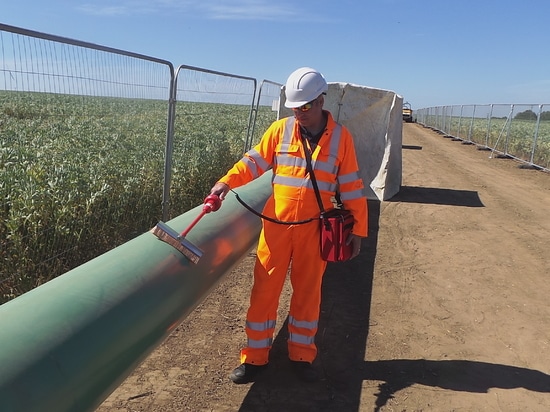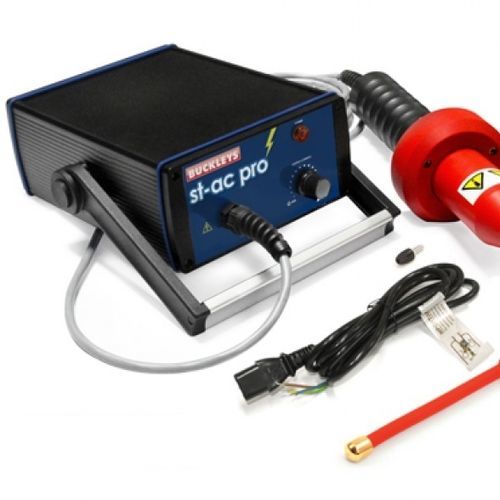
#Industry News
Test equipment and testing methods for corrosion protection in pipelines and structural steelwork
Focusing on the isolation and electrochemical protection implemented to prolong the life of pipeline steelwork.
Long-term environmental protection of capital assets is a key objective of the pipeline industry. Considerable time, effort and expertise is invested in the prevention of deterioration, of which – for structural steel – the biggest cause is corrosion.
It is, of course, well known that corrosion is an electrochemical effect which manifests itself in various ways, dependent on the mix of environmental factors at play. Subtle changes in salinity, water flow, temperature, oxygenation and more obvious variation in the condition of surface coatings such as damage and other protection systems will affect the rate of corrosion and thus the factor of safety that the steelwork under consideration provides over and above its design working loads, and ultimately, the life of the asset.
There are two key approaches to protection; physical isolation by means of surface treatments, coatings and overwraps as well as electrochemical protection by means of passive or active anodes. It is normal to use both approaches.
The physical approach to protection typically starts with a coating plant. The process involves shot-blast cleaning of the steelwork followed by surface coatings e.g. fusion-bonded epoxy; which provides a waterproof layer with excellent adhesion to the cleaned steel. Epoxy has sufficient flexibility to ensure that it is not damaged by the continual dimensional variation of steel, due to thermal expansion, contraction and load effects. Various layers may be applied to offer further mechanical and chemical protection, including hot-applied extruded polymers, wrapped onto the pipe’s surface.
The pipes are handled in such a way as to minimise damage to these layers. Field joints will be created during the installation of the string and these are protected by similar adhesive and wrapping systems – an area of considerable specialisation with several companies providing services using highly-skilled operators. Following completion of the welded joints, the pipeline would be coated and overwrapped, prior to the string being buried or launched. As part of the burial process, the pipeline may be further wrapped in a rock-protection layer to prevent or minimise physical damage.
The pipeline will typically be provided with fixed sacrificial anode installations at calculated intervals. The anodes would be installed on pads which are welded to the pipes and protrude through the insulating layer to be in intimate contact with the electrolyte; be it ground- or sea-water. Alternatively, an impressed-current corrosion prevention system may be implemented, along with a suitable bedding material for buried pipelines.
The combination of physical isolation and electrochemical protection – coupled with appropriate maintenance – will aim to ensure that the pipeline meets its design life.
Buckleys is a long-established manufacturing company based in the South East of England. We are ISO9001 accredited and have a long history of provision of test instruments for a variety of markets including the construction, coatings and plastics industries and in particular, Pinhole Detectors.
Pinhole or ‘Holiday’ detectors are high-voltage generators with built-in current-monitoring capability which detect flaws in the coating and are used to ensure that the isolation integrity during the pipe coating application and pipeline field jointing processes have been achieved and are maintained up to the point of burial or launch. Buckleys also produce a range of corrosion-monitoring and mitigation devices which may be deployed along the length of the pipe installation, or in the case of underwater pipelines, on a topical/periodic basis to assess the effectiveness of the corrosion protection systems.
Quality control plans in the pipe coating plants will typically call for a testing regime using pinhole detectors, accompanied by visual and dimensional assessment. A number of bodies, including NACE, have created a range of standards, which provide recommended voltage levels dependent on the coating thickness under test.
Buckleys’ DCCT Pro2 Pinhole Detectors are intended for the factory environment; being mains-powered, rack-mounted and designed for continuous operation with a range of outputs up to 40kV. Conversely, in the field, following field jointing or patch repair, the requirement is for a battery-powered and easily-portable instrument; Buckleys’ PHD Pro2 range of detectors is designed to address this need with instruments ranging from 1kV to 40kV capability.
To compliment the test instruments; a wide range of standard electrodes covering common pipe sizes is available. These include rolling-spring, metal brush and conductive rubber types for both the exterior and – where required – the interior of the pipe. Additionally, Buckleys are pleased to offer custom electrode design, source and manufacture, including the electrodes, insulators, support structure and associated wiring.
Following installation, monitoring equipment is required and Buckleys also provide a wide range of equipment. Our range of ground electrodes includes Copper-Copper Sulphate reference cells, machined steel probes of known surface areas which may be fitted to insulated ‘T-Handles’ for instantaneous ground current measurements, potted buried coupons for ongoing monitoring and AC mitigation diodes. Again, we are keen to respond to enquiries for special and custom electrodes, design and manufacture are carried out in house; using state-of-the-art 3D CAD and CNC machining processes. For underwater corrosion monitoring we offer a range of Silver-Silver Chloride reference cells, for temporary or permanent installation, along with a series of test devices.
Over nearly 90 years, Buckleys instruments have been designed and developed to provide the industry with reliable, non-destructive testing to verify the quality and condition of protective coatings during pipe manufacture, on-site during assembly, installation and throughout the lifetime of the pipeline to assist in the maintenance of these high-value assets in service.
We are pleased to provide details of our standard range of inspection instruments and - where there are particular customer needs - to discuss specific designs, development and provision of electrodes to suit.






